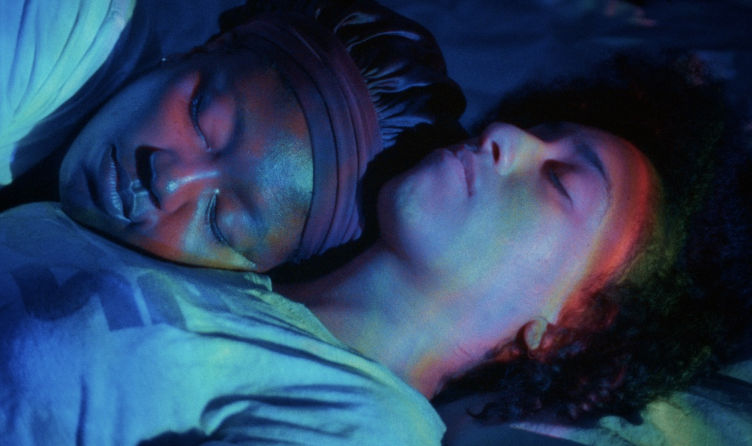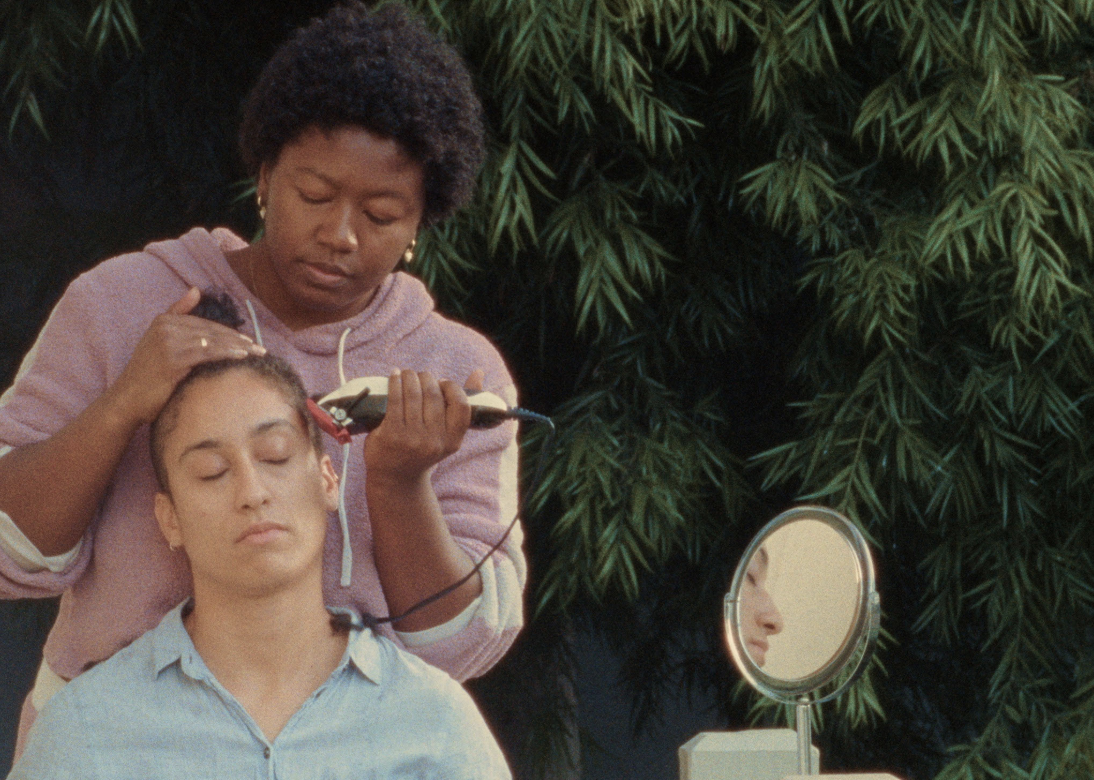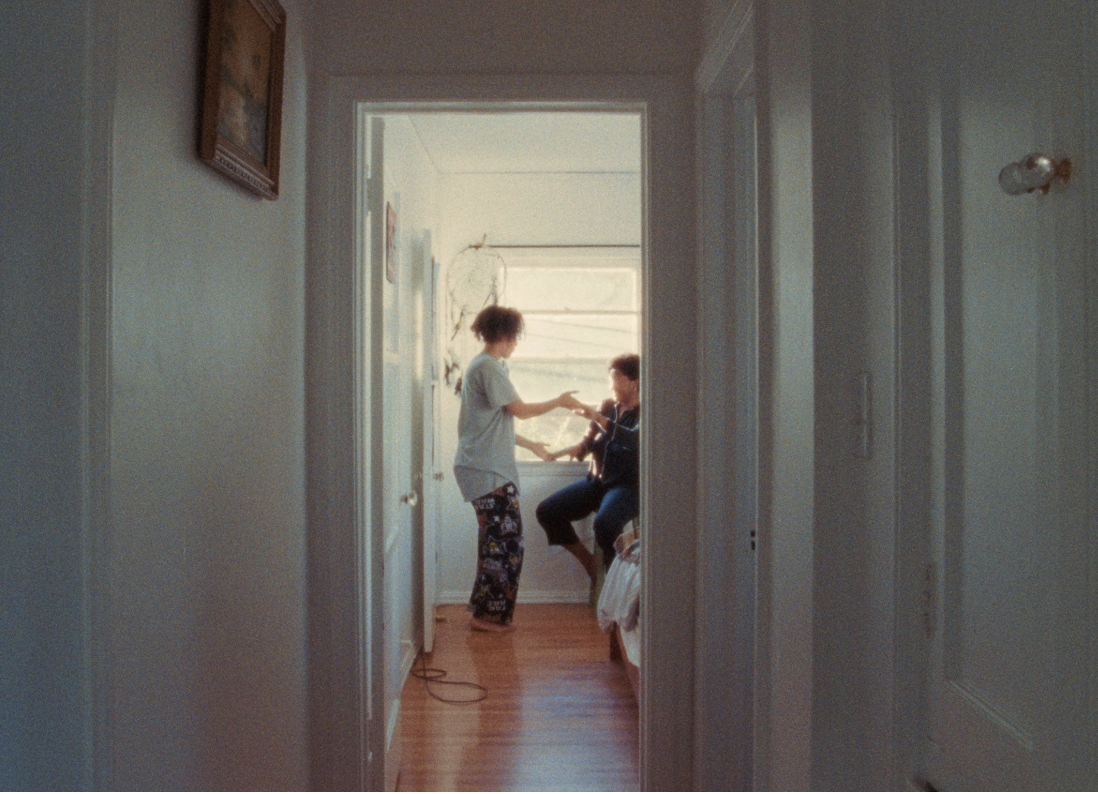
©Courtesy of PBS
Hold Me Close : A chronicle of the power and complexity of the relationship between Corinne and Tiana, two Queer Black women who experience cycles of life’s joys and pains together in the home they share.
Directors : Aurora Brachman, LaTajh Simmons-Weaver
Producers :Aurora Brachman, LaTajh Simmons-Weaver
Executive Producers : Opal Bennett, Kiyoko McCraye
Cinematographer : Aurora Brachman
Edited by : LaTajh Simmons-Weaver, Aurora Brachman
Year : 2024
Category : Short
Country : United States
Language : English
Run time :19 min

©Courtesy of PBS
\
Exclusive interview with Directors Aurora Brachman & Latajh Simmons-Weaver
Q : I really find it fascinating about this short film, really engaging. I’m curious to know how the genesis of this film came about and how PBS was involved in this project?
Aurora Brachman: This was a film I conceived many years ago. Latajh and I are a couple, but I started thinking about it before we met, I had never been in a relationship with another black woman before. But I had been in queer relationships, I loved how your partner can understand the way you move through the world, because you sort of have the same gender experience, And I was sort of fantasizing about, like, what would it be like to be in a relationship with another black woman?
Someone who can empathize with what it’s like to move the world as you do. And then we met and entered into our relationship, which is our first relationship with a black woman. Many of the questions that had been theoretical for me became concrete.
We were processing how we didn’t have a blueprint for what our relationship should or could look like and I asked if she would want to make the film with me. And then shortly after that, I ended up getting an email about this new funding initiative that was happening with POV(PBS-branded platform) and Chicken and Egg Films, they are potentially looking for pitches to finance projects, POV would finance them, and then POV would release them. And we ended up applying, that’s sort of how we got the funding to make this film. They’ve been on board since the beginning.
Q : How did you construct the dialogues in this short? You captured only certain moments of conversations that don’t seem to have a regular narrative filmmaking approach. It feels like capturing the atmosphere with dialogues. Do you know what I’m talking about?
LaTajh Simmons-Weaver: I think I understand. Cutting a lot of the dialogue was extremely hard. We audio recorded them over a month. We gave them(two of the cast) mics to record themselves. And then they would just send us the audio the next day from the previous day. And there was so much good stuff. There was like, if we could play the whole thing, we would, it was a witness to how much they loved each other and these beautiful conversations they had. But, I think we chose moments that…
Aurora Brachman: I think it was intuitive, We’re trying to give glimpses, we are not necessarily trying to construct a linear narrative with film in general. I think the idea was getting privileged glimpses into a couple’s life that you would never get because you’re never a participant in a relationship that other than your own, and I think we were really trying to capture an energy and create a book of feeling more than we were trying to tell a very linear story or complete story.
I think this is like an editing trick that a professor of mine once told me he was like: arrive late and leave early, he was like when cutting a scene arrive late to the moment and you leave before it ends. You want to leave people with a sense of being in the midst of the action and let them linger on it after, like you don’t need to give the entire arc of a moment.
I think that was very much the ethos of this. We just start to pass through time, passing through moments, passing through feelings. And hopefully the culmination of it is creating an impression of this relationship that’s special, but it’s not necessarily revealing everything or answering all your questions, but you understand the essence of the couple.
Q : Yeah, that’s what I take away from this film. So that’s what I was finding really engaging. Even though this film takes place in one apartment, you recognize the seasonal change. The sound of insects coming from outside. So how much are you conscious about those seasonal elements throughout the film?
Aurora Brachman: I love that you pointed that out because the temporal challenge of the film is like, the intention was when you’re watching it, visually, the narrative is the arc of a day, it starts at night, they wake up the next morning, go through a day, then it ends the following night, 24 hours. But the audio was recorded over a more extended period of time, and it was interesting, how are we going to evoke the sense of a passage of time, but visually it’s a shorter period, I think part of the way, we achieved that was through sound design and very carefully assessing how the light would move as we changed over the day.
That affected how we shot the film. The truth is that they don’t get any light in their bedroom in the morning, but we shot all the morning sequences in the late afternoon because we wanted to feel the sort of warmer tone of light and it was very intentional in both the sound design and in the way we were constructing it visually to have the tone of light the sound etc, give us a sense that maybe we’re on a longer journey while we’re also just covering one day. A little bit expanding and contracting time
LaTajh Simmons-Weaver: Yeah, we had originally had so many different ideas of how to capture that, but ultimately, we go up with these ways like the flower thing. We’re gonna like to have them plant something..
Aurora Brachman: Yeah, we had initially thought of..There’s a scene where she’s like making a bouquet and we had come back at a later date and the bouquet had died and wilted and we shot a scene that she’s replacing the flowers, like time has changed, but we just didn’t end up using it, but I’m glad that you still picked up on that, because I feel like it’s the questions that I was wondering how audiences is gonna engage with it, in terms of what is the spent of the time that we’re witnessing.

©Courtesy of PBS
Q : I also find it fascinating about the sequence that you shot from the back of the character, Corinne and Tiana, they are sort of like leaning each other in a bed, sort of like a cuddling, I find this very intimate and caring, how do you construct a shot? It was an intimate and a caring approach, rather than a more graphic or sexual approach.
Aurora Brachman: I think it’s the last scene in the film with the lights and stuff. Yeah, I think both ourselves and the couple were very conscious of not wanting to hyper sexualize them. Lesbian relationships are often hyper sexualized.
They were conscious of not wanting to be depicted in that way. And, you know, for us, I think we feel like we are queer women, you know, it’s like, there’s a sexuality that is fetishizing, that someone else could project on you, but then there is your own sexuality that is very liberating.
And we were trying to strike this careful balance of what is gonna capture that intimacy that it’s coming from their own ownership opposed to a fetishizing gaze on them, I think it was intuitive, the fact that their backs are turned, that was a shot you really wanted…(facing Latajh)
I was thinking about them laying in bed more and you were like, no, it would be beautiful that we don’t see their faces, and you wanted that scene.
LaTajh Simmons-Weaverr: Yeah, as we’re spending all this time with them(actors), I’m also coming from more of a fiction background, so I’m very cautious in how I want to put real people out there on film.
So I was like..this is such an intimate moment already, do we need to be all up in their face? Do they get to keep some piece of them private while we share this intimate conversation? I think that was just a good way to do it. Mixing super intimate conversation…
Aurora Brachman: It’s more guarded. It’s saying, the audience doesn’t get access to everything.
LaTajh Simmons-Weaver: Yeah, they don’t get to see every single thing.
Q : I thought that was a really brilliant approach to actually showing an intimate scene. In this film Corinne and Tiana talk about gender fluidity. What does it mean to you? I’m curious to know what your view on that is?
Aurora Brachman: I think you like for queer people, especially like, of our generation and like queer people who are assigned female at birth.
I think it is so normalized in our community that a lot of people are doing a lot of sort of like gender exploration. So I feel like it was so normal that Corinne is like non binary and navigating pronouns and the pronoun conversation. To me if this film really an embodiment of like this moment in a particular queer culture.
It’s so normal. People’s gender identities are quite fluid and it’s something that people are very comfortable with. And so I love that we get to see them engaging in the pronoun conversation so casually. My previous partner before my relationship with Latajh only used these pronouns. My mom didn’t know how to do it. Then, when my mom met Latajh, my mom was like, Oh, Is it she? Is it they?
LaTajh Simmons-Weaver: Call what you want.
Aurora Brachman: Yeah, it’s such a common part of relationships. Generational differences, too. It was super important to show the way those conversations get navigated.
LaTajh Simmons-Weaver: Exactly Aurora said, in my community it’s such a natural thing, I don’t even think about it, but I do know the feeling of being misgendered, or not knowing how to do the pronouns, so it was nice to have that moment in there and we also laugh about those things.
Q : This film was selected at Sundance. How do you want the audience to take away this film? Because I thought that was a really meaningful and engaging film, I feel like it’s even telling more than 3 hours of film. It’s a revelation to me.
LaTajh Simmons-Weaver : Thank you. I would say that love is universal. Of course, everything is political, but when we’re in our intimate spaces, we are not thinking about politics.
We’re thinking about love and how to navigate those things. So I just want people to take away that like, this is what love could look like. Love has no gender, race, or anything. This is what it is.
Aurora Brachman: I think I want people to leave with a feeling really…I don’t think we were trying to make a political statement with the film. I think anyone can watch this film and find themselves in it. Or find something they aspire to in their own romantic relationship in the film. To me, the film is an immersion in a moment in a couple’s life. And it’s about evoking a feeling. I think we all have complicated romantic histories and attachment wounds. I hope the film can feel like a balm for that, either it’s aspirational, it’s what you want, what you have, and something that feels safe for people to witness.
If you like the interview, share your thoughts below!
Check out more of Nobuhiro’s articles.
Meet the Artist 2025: Aurora Brachman and LaTajh Simmons-Weaver on “Hold Me Close”

